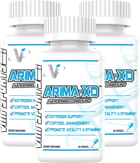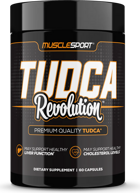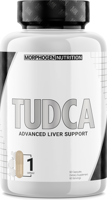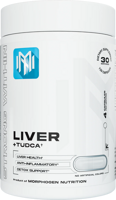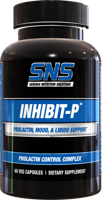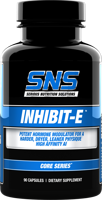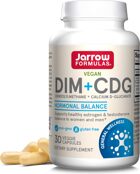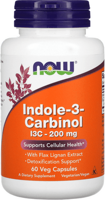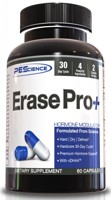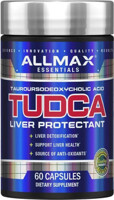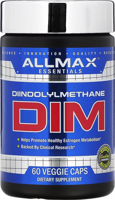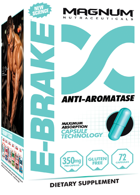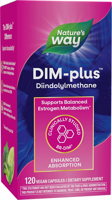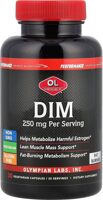Have you ever heard the phrase "think twice before you speak once"?
Consider this one of those times to take that advice - but in this case, we're talking about the research you need to do before beginning a hardcore hormone cycle.
We wrote this guide on post cycle therapy (PCT) as starting point for your research, and the comments are open for discussion. We don't necessarily recommend you go down this road -- especially if you're too young or you've never put the real time into the gym -- but if you are going to go down this road, then you might as well do it right.
If you're new to the world of steroids / exogenous hormones, right now you need to realize how seriously important this information is. Failing to do your homework here is a serious risk, and may cause permanent harm to yourself and your man-parts.
There are very few books that even remotely tackle the intricate process of cycling. You're venturing into semi-uncharted (and often illegal) territory. The best way to keep your system intact is to start small with mild compounds, PCT properly, and take enough time off in between cycles!
So look before you leap, and get your PCT game set up prior to starting any type of cycle. This guide takes a relatively conservative approach, and in our opinions, that's the only way to go when stepping into this realm.
Note: If this has already scared you off from taking hardcore exogenous hormones, you may be more interested in our new article on natural muscle building supplements. That article is geared towards intermediate users.
An introduction to Post Cycle Therapy
When any exogenous hormone (such as SARMs, designer / anabolic androgenic steroids, or PH) are used, your natural testosterone production will be suppressed. When the use of these exogenous hormones is discontinued, natural testosterone production will still be suppressed, and if left to recover naturally will take an extended period of time. A PCT, or post cycle therapy, is used to help the recovery process happen much faster.
Every person's natural testosterone rebound is different (and it also depends on the type of compound taken and for what duration). But if you don't properly run PCT, the best case scenario is that you'll recover in a few months. Worst case scenario? A year or more… with the potential of a permanent HTPA shutdown if it is stressed too much. This basically means the the ruination of the complex set of feedback mechanisms along the Hypothalamic–pituitary–adrenal axis - no more natural test production for you. So please understand the risks and what is happening to your body before you start yourself down this path, and then talk to an experienced doctor or endocrinologist.
A SERM is a staple
The backbone of every PCT should be a SERM (Selective Estrogen Receptor Modulator), such as Nolvadex (Tamoxifen Citrate) or Clomid (Clomiphene). These are prescription drugs, and they must be taken with any hormonal compound that will affect your natural testosterone production to some degree. That's right - the over-the-counter PCT supplements sold in online retailers (and discussed later in this paper) aren't enough on their own -- they definitely help cover some of the gaps that these prescription drugs miss, but you need to speak to your endocrinologist and do it right with these, or not do it at all.
Be careful NOT to confuse SERM with SARM (Selective Androgen Receptor Modulator). SARMs are suppressive and will NOT help in the recovery process. A SERM, like those mentioned above, is very effective at stimulating the pituitary gland to release more luteinizing hormone and follicle stimulating hormone.[1,2,3,4,5] As a result, the testicles will be stimulated to produce more testosterone.[2,5]
Timing your PCT
The hormone that was used while on cycle plays a big factor in when to start PCT.
- Oral SARM's, PHs, and designer steroids all have a short half-life (usually 24 hours or less).[6] So, PCT (both the prescription SERMs and the OTC supplements discussed below) need to be started the day after your last cycle dose.
-
Anabolic androgenic steroids are different, because of the esters used to prolong half-life.
- With large ester AAS's, the user will want to wait 14-18 days before beginning PCT.
- For smaller ester AAS's, it's recommended the user wait 3-5 days before beginning their PCT.
Steroid esters are made up of chain linked atoms, primarily carbon. The length of this carbon chain, speed of hydrolyzation, and the depot in the blood stream determines the half life of the steroid.
The more carbon atoms present within the ester, the longer the half life. This is because the more carbon atoms in the ester, the less soluble it is in the blood stream and the harder it is to be broken down by the body.[7]
See table 1 to determine what esters are large and small:
TABLE 1: Large and Small Esters
In general, short ester steroids are usually as an acetate or propionate. Ethanate and up is considered large ester.
| SHORT ESTERS: | LARGE ESTERS: |
|---|---|
| Formate (1 carbon atom) | Ethanate (8 carbon atoms) |
| Acetate (2 carbon atoms) | Octanoate (8 carbon atoms) |
| Propionate (3 carbon atoms) | Cypionate (8 carbon atoms) |
| Butyrate (4 carbon atoms) | Nonanoate (9 carbon atoms) |
| Valerate (5 carbon atoms) | Decanoate (10 carbon atoms) |
| Hexanoate (6 carbon atoms) | Undecanoate (11 carbon atoms) |
| Heptanoate (7 carbon atoms) |
How long to stay off and run PCT?
There is an important rule when cycling exogenous hormones: time on cycle + PCT = time off cycle. This allows the body to reach homeostasis again, and stay that way for an appropriate amount of time.
In the above equation, realize that PCT is included in the overall cycle length.Example
So, if on-cycle is 6 weeks, and PCT is 4 weeks, that means you're running a 10 week cycle. Then, you are completely off of everything for another ten weeks to completely normalize hormone levels! After that, you can assess and start again. Following this rule allows for the least amount of strain on the HPTA (Hypothalamic Pituitary Testicular Axis), and lessening the chance of permanent HPTA shutdown, as mentioned above. However, PCT should NOT be used if the user plans to use any exogenous hormones sooner than time on + PCT = time off. It is better to leave testosterone levels low, rather than "roller-coaster" the natural hormones up and down. To "roller-coaster" the hormones can put a lot of stress on the body and can permanently damage the HPTA. For example, here are three situations:- Option A:
- ON: 6 Weeks (consider reversible / non-suicidal AI at this time if using an aromatizing AAS/PH/DS)
- PCT: 4 Weeks (consider an irreversible / suicide AI at this time, discussed below)
- OFF EVERYTHING: 10 Weeks
- Option B:
- ON: 6 Weeks
- OFF: 4 Weeks
- Then back ON...
- Option C (not recommended!!!!!!!)
- ON: 6 Weeks
- PCT: 4 Weeks
- Then back on…
^^^ DO NOT DO THIS!! Too many people do this, as discussed below!
This is a general strategy and guideline, but it obviously depends on what exactly you're taking and for how long. As always, work with your medical practitioner, plan, and have the necessary compounds in hand before beginning!
And in case you missed the sidebar, no matter what you do, get your blood work done before, during, and after your cycle - always! This is the only way to really guide your way through the maze of options available to you.
What do I do during my time off all hormones?
Just because you're off for ten weeks doesn't mean you must get off all supplements and supporting ingredients. Right now is a great time to try a few non-hormonal supplements.
The libido edge
![Tongkat Ali could be great during the off-time of your cycle, as it improves overall physical functioning and vitality.<sup>[9]</sup>](https://blog.priceplow.com/wp-content/uploads/post-cycle-therapy-tongkat-ali-300x210.jpg)
Tongkat Ali could be great during the off-time of your cycle, as it improves overall physical functioning and vitality.[9]
You can click the links to read a bit more about them after you finish reading this critically important document.
Because next up, we need to work on keeping estrogen under control, and that's the next most important thing to discuss:
The estrogen problem
Controlling estrogen is very important during PCT. If estrogen is too high, it can cause gynecomastia, which is obviously no fun. The strategy for this often involves an AI:
Aromatase inhibitors
Aromatase inhibitors, or AI's, are another popular PCT tool. Aromatase inhibitors bind to the aromatase enzyme, which prevents them from binding to the receptor. This, in turn, keeps the body from turning testosterone into estrogen!
When estrogen levels are low (due to taking an AI), luteinizing hormone rises -- this is an inverse relationship.[11] As a result, the testes are signalled to make more testosterone so that the testosterone can be turned into estrogen. Yet when estrogen is too high, luteinizing hormone is lowered causing testosterone production to decline.[12] Maintaining this balance is key, and once again, best done under a doctor's watchful eye.
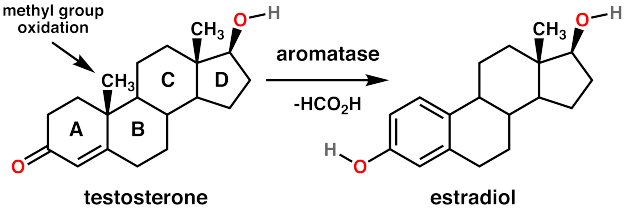
Aromatase Inhibitor. Per Wikimedia Commons, the general reaction of testosterone's conversion to estradiol, which is catalyzed by aromatase. Steroids are made of four fused rings (see the letters A-D). Aromatase converts ring
Reversible and Irreversible AIs
There are 2 types of aromatase inhibitors: irreversible (suicidal) and reversible (non-suicidal). Suicidal / irreversible AIs totally kill off the estrogen at the receptor, whereas non-suicidal / reversible AIs bind and reduce estrogen but do not kill it. Let's get into more detail here:
Irreversible AIs (exemestane, arimistane) permanently bind to the aromatase enzyme, permanently deactivating it. As a result, this means there is less of a chance of rebound. A suicide AI attaches to the aromatase enzyme and deactivates it for the life of the aromatase enzyme. Note that the body is constantly making new cells and enzymes as the old ones die off.
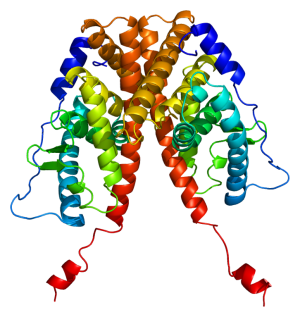
Estrogen Receptor 1 - Can we bind to this to keep estrogen levels at bay? Image courtesy of Wikimedia Commons
So, an irreversible / suicide AI is best suited for PCT. Not only is there less chance of rebound, they also increase IGF-1 levels, which is also great for PCT.
Reversible AI's (anastrozole, letrozole), on the other hand, are nonsteroidal and inhibit the synthesis of estrogen, through reversible competition for the aromatase enzyme.
Reversible AI's are better suited for on cycle, and being used in conjunction with aromatizing AAS's, PH's, and DS's. The compounds that aromatize, or turn into estrogen after interacting with the aromatase enzyme. You control this while on cycle with an AI. If not… you run the serious risk of gynecomastia, which is why this is so important.
We also discuss arimistane, an over-the-counter AI, in the next section.
Now that we have discussed the basics of what a PCT is, we shall now delve into some information as to what benefits are derived from a PCT supplement, what differences there are in certain ingredients, and the missing link in research:
PCT Supplement Support
This section covers common OTC (over the counter) supplement ingredients to add to a PCT, and the more bio-available forms available to consumers. We'll also discuss some common misconceptions that have developed over time.
There are several OTC PCT options available to use in conjunction with the prescription SERMs discussed above. These are usually all-in-one supplements that help boost testosterone, but they can also help encourage healthy blood pressure levels and lipid profile.
Again, these are great supplements to use in addition to a prescription-based SERM. PCT supplements alone are not usually enough!
Why does this Post Cycle Therapy guide contain so many compounds?
All of the various things discussed here (SERMs, AIs, OTC PCT supps) work through different pathways. Restoring the HPTA is a multi-faceted challenge.
Also, the quicker you get your testosterone levels back up, the more of your gains from your cycle you'll be able to keep.
PCT is the most important part of cycling, it is not a "take this one thing and be ok" kind of thing. There is not just one pathway to deal with here, and that means there's not just one do-it-all ingredient.
When it comes to PCT supplements, several forums are overloaded with tons of information, some good but much of it bad. There's been unsolicited information regarding the use of a proper PCT in place.
-
Arimistane: Mild OTC estrogen control
One thing to consider is a 7-oxo derivative, such as Arimistane (Androst 3,5-dien-7,17-dione). This is an OTC aromatase inhibitor that's a metabolite of 7-Keto DHEA. It is good for mild estrogen control and also lowers cortisol, and it's prudent to have one of these around at all times.
As mentioned above, arimistane is a suicide aromatase inhibitor - it permanently shuts down a receptor, causing the effect to last longer than a non-suicidal one (remember, your body is always creating new receptors so it's not "forever" permanent).
The most relevant study showing its capability as an AI was evaluating several 7-oxo derivatives, and arimistane (3,5-dien) turned out to be quite effective.[13,14]
Anecdotally, when users take it on its own, they lean out, have better recovery, and libido increases are reported. It provides a great hardening effect -- these are all attributes of reduced bad estrogen.
But on top of reducing estrogen, can we also quickly boost natural test levels? The answer is yes:
-
D-Aspartic Acid: A temporary test boost just when we need it
The missing link and what the research suggests…
D-Aspartic Acid was heavily marketed as the new natural testosterone booster dujour from around 2011 - 2014, and still frequently is. The data looked amazing: an incredible testosterone boost just 12 days in after taking 3g of DAA per day![15]
What nobody was saying at the time, however, was that after those first two weeks, the boosted testosterone levels returned to normal within the month.[16,17]
This newfound fact effectively made DAA more of a "sex supplement" -- great for an awesome couple of weeks, but perhaps overrated as a standalone test booster. Yet this still makes it a perfect tool to help out during the early and critical stages of PCT!
Before we go further, realize that DAA comes from the amino acid, aspartic acid. L-Aspartate also come s from aspartic acid, but L-Aspartate does not have the same benefits of DAA. L-Aspartic Acid is not the same and will not bring the same benefits we're about to discuss with D-Aspartic Acid! Point being, don't let shady supplement companies sell L-Aspartic Acid and call it a test booster -- we've seen this before and it's wrong on all levels.
With that now cautioned, there are also a few different forms of DAA: Amongst them are standard D-Aspartic Acid and Sodium DAA (Na D-AA).
Starting with standard DAA, the aforementioned 12-day study showed an increase of testosterone by 15% after six days and 42% after twelve days relative to baseline, but it then declined to 22% after three days of cessation.[15]
And again, further studies showed that after 28 days of supplementation with regular DAA failed to significantly increase lean mass in otherwise healthy trained subjects. On top of that, power output (as assessed by leg and bench press) remained unchanged at month's end. 3g of DAA failed to significantly reduce fat mass relative to placebo.[16] With standard DAA, the biggest changes are in the sexual parameters, such as fertility, sperm count, and seminal motility - good things, but perhaps not perfectly suited to our goals.
D-Aspartic Acid and Testosterone. D-Aspartic Acid provides for a fantastic rise in testosterone after about two weeks or so... but right after that... the levels start to return to baseline. This still makes it very useful for the critical first two weeks of PCT.
What about sodium DAA?
So let's turn to Sodium D-AA next. Recent research on Sodium D-Aspartic Acid has shown that it serves as a specialized neurotransmitter in parts of the nervous system involved in hormone production.[18] Like regular DAA, it's been shown to stimulate the release of LH and GH from the pituitary gland, and also has a direct stimulating effect in the testes on testosterone production.
There are a few reasons that sodium DAA is a bit of a better variation:
-
It has more direct evidence of success on healthy males, as demonstrated by two studies.[15,17]
-
The sodium fixes the solubility and bioavailability issue with DAA.
This is "theoretical" but generally accepted since regular DAA doesn't properly dissolve in water and has poor gastrointestinal uptake.![D-Aspartic Acid Post Cycle Therapy. Similar to the chart displayed above, DAA definitely increases testosterone in men, but it will get back to baseline after a few weeks of non-use.<sup>[19]</sup>](https://blog.priceplow.com/wp-content/uploads/d-aspartic-acid-post-cycle-therapy-300x251.png)
D-Aspartic Acid Post Cycle Therapy. Similar to the chart displayed above, DAA definitely increases testosterone in men, but it will get back to baseline after a few weeks of non-use.[19]
So not only will sodium DAA get absorbed better, it will also prevent the upset stomachs that normal bulk DAA too frequently causes. Again, this is theoretical, but the anecdotal reviews for those who have trouble with DAA confirm this.
-
The natural secretion and uptake of aspartate is sodium-dependent, so it naturally makes sense to bond sodium alongside when supplementing it.[19]
The evidence has slowly accumulated on the side of sodium DAA. Both may work, but sodium works better. It's also more expensive, but the beginning of your PCT is not exactly the smartest time to be cheap.
-
-
Resveratrol also assists in a multitude of helpful areas
Resveratrol (also known as cis-resveratrol) is the beneficial compound found in red wine that is associated with life extension and some of the health benefits in wine. It's produced in grapes as a defence against toxins, and is contained in the skins.
It also shares a lot of beneficial effects with many bioflavonoids, such as reducing the occurrence of osteoporosis, beneficially influencing fat cell production (in favour of long-term fat loss) and modulating blood pressure -- usually a reduction of blood pressure.[20]
Trans-Resveratrol: The Active Form
Trans-resveratrol is the active form of resveratrol. As the simple change results in a largely different molecule, many actions seen from trans-resveratrol are not seen with cis-resveratrol. These actions include the anti-inflammatory response, and even a more potent anti-proliferative effect on some cancer cells - especially the ones it comes into direct contact with![21,22]
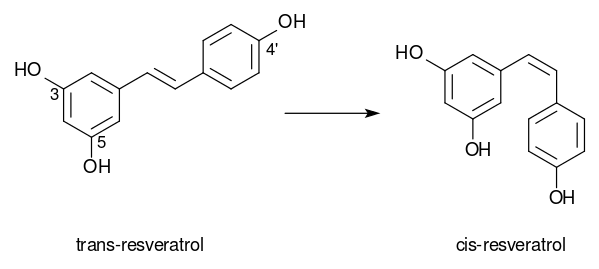
Trans Resveratrol, being the active form, is shown to have several times the antioxidant activity than the standard form
It should be noted that most research is focused on trans-resveratrol, yet too many supplements sell the cheaper (and less-effective) 'standard' form! In terms of post-cycle support, the more exhaustive successful research makes trans-resveratrol more ideal to be part of a PCT supplement. Not to mention, it's the more bioactive form with more potent antioxidant properties and protective inflammatory response.
Once again, this is not the time to be cheap. Let's look at the other research behind the bioactive form of this antioxidant.
-
Liver support
In the liver, resveratrol seems to be cancer-preventative by acting against hepatocellular carcinoma proliferation in vitro.[23]
-
Blood pressure support
Trans-resveratrol is also able to manage blood glucose levels and improve blood flow and vasorelaxation (eNOS).[24]
-
Blood glucose support
Resveratrol appears to benefit glucose metabolism, with lower doses needed for those in worse metabolic condition (insulin resistant, diabetic) and higher doses needed for those in pre-clinical disease states. With that said, it may not be effective in healthy persons at increasing insulin sensitivity, and appears to exert temporary benefit.
Trans Resveratrol can upregulate eNOS mRNA in isolated endothelial cells.[24] What's interesting about the study cited is that the effect seen here is normally a function of estrogen receptors, but estrogen receptors were not activated by the resveratrol. This means you get the cardiovascular benefit you want, without the side effect you don't.
Moreover, there is a possibility that estrogen may be reduced with supplementation:
-
Estrogen control
One study done showed that In breast cancer cells, resveratrol can inhibit aromatase with an IC(50) value of 25microM by both competitive and non-competitive means.[25]
-
Athletic Strength and Performance
Now let's look at its impact on strength, body composition and performance. Resveratrol can inhibit fatty acid synthase,[26] meaning it may reduce the production of fats from blood sugar. On top of that, it might also inhibit lipoprotein lipase,[27] which could result in lower cellular uptake of free fatty acids (that is one of lipoprotein lipase's jobs).
Trans-Resveratrol increases UCP-1 (upregulation of protein uncoupling), thereby increasing thermogenesis and has the ability to inhibit phosphodiesterase enzymes, which is synergistic with caffeine (and a notable fat-loss switch).[28] This also turns on the cAMP (cyclic adenosine monophosphate) in cells for increased fat burning.[29,30]
Together with the above abilities, there is a very important nexus between Sodium D-AA and Trans-Resveratrol: they both induce steroidogenesis acute regulatory protein (StAR), the rate limiting step in steroid synthesis.[31] Topped with resveratrol's ability to regulate estrogen, and you have a near PCT-necessity!
-
-
Prolactin: Not interested in lactating? Then keep this down
One last thing to watch out for is prolactin:
[33]"="" resulting="" src="https://blog.priceplow.com/wp-content/uploads/prolactin-dopamine-300x241.gif" style="" suppression="" the="" this="" to="" via="" which="" width="300"/>
This image is referenced by a study showing the competition of prolactin release and dopamine.
Various types of steroids are recognized by the human body as progestins. This may cause an increase in prolactin,[32] the well-known protein that enables females to produce milk. This condition is cited as "testosterone-induced hyperprolactinaemia" in the aforementioned, study.
As if that weren't bad enough, when prolactin is elevated, it may also suppress testosterone production and continue the negative feedback loop we need to stop during this critical time. Maintaining an optimal Androgen:Estrogen ratio is important to keeping Prolactin in check, as shown in the study cited above where there was a significant Prolactin increase during Testosterone administration. It occurred when the administered testosterone aromatized as a result of the aromatization of the administered Testosterone into Estrogen.
There are several ways to combat elevated prolactin. One such way is to activate the dopamine-prolactin connection. Dopamine and prolactin are actually antagonists of each other -- if you increase dopamine, you will decrease prolactin.
There are several ways of boosting dopamine – after all, many of our favorite stimulant supplements on this site contain various dopamine-boosters. But we're not interested in the stim effects of dopamine right now, and none of them have actual research connecting to prolactin.
One popular and well-researched ingredient, however, does:
Mucuna pruriens.
Many of us already know about mucuna pruriens, and its primary constituent, L-Dopa, which have been implicated in reducing stress/cortisol[34,35] and boosting growth hormone levels in higher doses.[34,36]
Regarding prolactin, there is an en-vivo study published on men showing that mucuna pruriens reduced prolactin levels.[37] Admittedly, they used a very large dose of 5g/day, but it increased dopamine levels and decreased prolactin, as planned.
Another easy, cheap, healthy, and stimulant-free way of attacking prolactin is with Vitamin B6 (pyridoxine). Once again, the data shows that it's able to regulate prolactin levels via agonism of dopamine.[38,39]
So the combination of mucuna and B6 is a great start to keeping these levels down, and keeping your body from receiving any unnecessary lactation signals. However, if you're ever experiencing gynecomastia, it's best that you speak with your endocrinologist immediately and get blood tests done.
Getting back to PCT Supplements: What do we need?
So let's circle back and discuss what we need in an OTC PCT supplement:
- Testosterone repair and amplification - to ensure that the natural levels are restored as quickly as possible.
- Estrogen modulation - Counteract any gynecomastia that is lingering around as well as any excess estrogen and excess water from a "cycle".
- Antioxidant and Liver Protection - cleanse and rejuvenate the liver and kidneys to ensure they are working as much as possible to metabolize the exogenous testosterone.
- Prolactin control - Used in combination with the Estrogen modulation for control of any changes to the pituitary gland.
Going further against prolactin
If prolactin issues are of greater concern, there's one extra ingredient in SNS Inhibit-P that you may also want to invest in and have on the ready.
Further reading
Remember, when synthetic hormones are used, our natural testosterone production is suppressed. There are a lot of things to do to get the system back up and running as soon as possible: the OTC PCT options mentioned above, a pharmaceutical prescription SERM, any natural testosterone boosting support, and an aromatase inhibitor. This ensures that you get your natural testosterone levels back on track and to avoid any possible estrogen rebound once a cycle is finished.
Beginners who are new to PH's and designer steroids can easily get caught up on just going by what people say on a forum, but there is simply too much noise out there. A proper PCT is just as important as a properly laid out cycle for your goals.
The best book to really understand the fundamentals and mechanics of anabolics and their derivatives is the ANABOLICS, 10th ed. by William Llewellyn.[40] This book delves into what anabolics are, what they comprise of, their effects, stacking and synergies of using multiple compounds and so forth.
If you're going to do it, do it right
Note that this article does not mean that we condone the use of research chemicals, anabolic steroids, SARMs, or other SERMs without a doctor's prescription.
It goes without saying that far too many people get into the "hardcore stuff" without a proper PCT in place or blood tests scheduled, and that is what we wish to avoid. Too many people have too many regrets - we don't need any more.
So if you're going to jump into this world -- and we by no means encourage it -- at least do it right. Under your endocrinologist's direct supervision and regular blood testing, these products can help keep you balanced.
References
- Sánchez-Criado, JE; "Tamoxifen but not other selective estrogen receptor modulators antagonizes estrogen actions on luteinizing hormone secretion while inducing gonadotropin-releasing hormone self-priming in the rat."; Neuroendocrinology. 2002 Oct;76(4):203-13; Retrieved from https://pubmed.ncbi.nlm.nih.gov/12411737
- Stahl, F; "Effects of tamoxifen on the levels of luteinizing hormone (LH), follicle stimulating hormone (FSH), prolactin (PRL), 17 beta-oestradiol (E2), total and free testosterone (T) and total and free dihydrotestosterone (DHT) in blood of patients with benign prostatic hyperplasia."; Exp Clin Endocrinol. 1983 Jul;82(1):21-8; Retrieved from https://pubmed.ncbi.nlm.nih.gov/6193975
- Archer, D; "Luteinizing hormone secretion throughout the menstrual cycle."; Am J Obstet Gynecol. 1989 Sep;161(3):581-9; Retrieved from https://pubmed.ncbi.nlm.nih.gov/2782339
- Ginsburg, J; "Use of Clomiphene and Luteinizing Hormone/follicle Stimulating Hormone-Releasing Hormone in Investigation of Ovulatory Failure."; British Medical Journal 3.5976 (1975): 130–133; Retrieved from https://www.ncbi.nlm.nih.gov/pmc/articles/PMC1673999/
- Vermeulen, A; "Hormonal effects of an antiestrogen, tamoxifen, in normal and oligospermic men."; Fertil Steril. 1978 Mar;29(3):320-7; Retrieved from https://pubmed.ncbi.nlm.nih.gov/640052
- Narayanan, Ramesh et al. "Selective Androgen Receptor Modulators in Preclinical and Clinical Development ." Nuclear Receptor Signaling 6 (2008): e010. PMC; Retrieved from https://www.ncbi.nlm.nih.gov/pmc/articles/PMC2602589/
- Clark, J; "Properties of Esters: Solubility in Water"; UC Davis ChemWiki; Retrieved from https://chemwiki.ucdavis.edu/Organic_Chemistry/Esters/Properties_of_Esters#Solubility_in_water
- Bowen, R; "Gonadotropins: Luteinizing and Follicle Stimulating Hormones"; Colorado State University; May 13, 2004; Retrieved from https://arbl.cvmbs.colostate.edu/hbooks/pathphys/endocrine/hypopit/lhfsh.html
- Ismail, S; "Randomized Clinical Trial on the Use of PHYSTA Freeze-Dried Water Extract of Eurycoma longifolia for the Improvement of Quality of Life and Sexual Well-Being in Men"; Evidence-Based Complementary and Alternative Medicine Volume 2012 (2012), Article ID 429268; Retrieved from https://www.hindawi.com/journals/ecam/2012/429268/
- Bin Mohd Tambi, Mohd Ismail, and M. Kamarul Imran. "Eurycoma Longifolia Jack in Managing Idiopathic Male Infertility." Asian Journal of Andrology 12.3 (2010): 376–380. PMC; Retrieved from https://www.ncbi.nlm.nih.gov/pmc/articles/PMC3739276/
- Pitteloud, Nelly et al. "Inhibition of Luteinizing Hormone Secretion by Testosterone in Men Requires Aromatization for Its Pituitary But Not Its Hypothalamic Effects: Evidence from the Tandem Study of Normal and Gonadotropin-Releasing Hormone-Deficient Men." The Journal of Clinical Endocrinology and Metabolism 93.3 (2008): 784–791; Retrieved from https://www.ncbi.nlm.nih.gov/pmc/articles/PMC2266963/
- Dolecek, R; "Very low serum testosterone levels and severe impairment of spermatogenesis in burned male patients. Correlations with basal levels and levels of FSH, LH and PRL after LHRH + TRH."; Endocrinol Exp. 1983 Mar;17(1):33-45; Retrieved from https://pubmed.ncbi.nlm.nih.gov/6409583
- National Center for Biotechnology Information; PubChem Open Chemistry Database; "In Vitro Competitive Inhibitory Activity Was Measured On Cytochrome P450 19A1 Of Human Placental Microsomes"; Retrieved from https://pubchem.ncbi.nlm.nih.gov/bioassay/53550#section=Top
- Numazawa, M; "Synthesis of androst-5-en-7-ones and androsta-3,5-dien-7-ones and their related 7-deoxy analogs as conformational and catalytic probes for the active site of aromatase."; J Med Chem. 1994 Jul 8;37(14):2198-205; Retrieved from https://ncbi.nlm.nih.gov/pubmed/8035427
- Topo, Enza; "The Role and Molecular Mechanism of D-Aspartic Acid in the Release and Synthesis of LH and Testosterone in Humans and Rats." Reproductive Biology and Endocrinology: RB&E 7 (2009): 120. PMC; Retrieved from https://www.ncbi.nlm.nih.gov/pmc/articles/PMC2774316/
- Willoughby, Darryn; "d-Aspartic acid supplementation combined with 28 days of heavy resistance training has no effect on body composition, muscle strength, and serum hormones associated with the hypothalamo-pituitary-gonadal axis in resistance-trained men"; Nutrition Research Volume 33, Issue 310, Pages 803-810; October 2013; Retrieved from https://www.nrjournal.com/article/S0271-5317(13)00173-5/abstract
- G. D'Aniello; "D-Aspartate, a Key Element for the Improvement of Sperm Quality"; Advances in Sexual Medicine, Vol. 2 No. 4, 2012, pp. 45-53; Retrieved from https://www.scirp.org/journal/PaperInformation.aspx?paperID=24016
- D'Aniello, Antimo, et al.; "D-Aspartic Acid Regulates the Release and Synthesis of LH and Testosterone in Human."; 2008; Source available upon request
- Yatsushiro, S; "L-aspartate but not the D form is secreted through microvesicle-mediated exocytosis and is sequestered through Na+-dependent transporter in rat pinealocytes."; J Neurochem. 1997 Jul;69(1):340-7; Retrieved from https://pubmed.ncbi.nlm.nih.gov/9202328
- Timmers, Silvie et al; "Calorie Restriction-like Effects of 30 Days of Resveratrol (resVidaTM) Supplementation on Energy Metabolism and Metabolic Profile in Obese Humans"; Cell metabolism 14.5 (2011): 10.1016/j.cmet.2011.10.002. PMC; Retrieved from https://www.ncbi.nlm.nih.gov/pmc/articles/PMC3880862/
- Athar, Mohammad et al; "Resveratrol: A Review of Pre-Clinical Studies for Human Cancer Prevention"; Toxicology and applied pharmacology 224.3 (2007): 274–283. PMC; Retrieved from https://www.ncbi.nlm.nih.gov/pmc/articles/PMC2083123/
- Gao, X; "Disparate in vitro and in vivo antileukemic effects of resveratrol, a natural polyphenolic compound found in grapes."; J Nutr. 2002 Jul;132(7):2076-81; Retrieved from https://pubmed.ncbi.nlm.nih.gov/12097696
- Sun, Zhong-Jie; "Anti-hepatoma activity of resveratrol in vitro"; World J Gastroenterol 2002; February 8(1):79-81; Retrieved from https://www.wjgnet.com/1007-9327/full/v8/i1/79.htm and https://pubmed.ncbi.nlm.nih.gov/11833076
- Wallerath, T; "Resveratrol, a polyphenolic phytoalexin present in red wine, enhances expression and activity of endothelial nitric oxide synthase."; Circulation. 2002 Sep 24;106(13):1652-8; Retrieved from https://pubmed.ncbi.nlm.nih.gov/12270858
- Wang, Yun; "The Red Wine Polyphenol Resveratrol Displays Bilevel Inhibition on Aromatase in Breast Cancer Cells"; Toxicol. Sci. (July 2006) 92 (1): 71-77; April 11, 2006; Retrieved from https://toxsci.oxfordjournals.org/content/92/1/71.long
- Fischer-Posovszky, P; "Resveratrol regulates human adipocyte number and function in a Sirt1-dependent manner"; Am J Clin Nutr. 2010 Jul;92(1):5-15; Retrieved from https://pubmed.ncbi.nlm.nih.gov/20463039
- Rayalam, S; "Resveratrol induces apoptosis and inhibits adipogenesis in 3T3-L1 adipocytes"; Phytother Res. 2008 Oct;22(10):1367-71; Retrieved from https://pubmed.ncbi.nlm.nih.gov/18688788
- Shi, T; "SIRT3, a mitochondrial sirtuin deacetylase, regulates mitochondrial function and thermogenesis in brown adipocytes."; J Biol Chem. 2005 Apr 8;280(14):13560-7; Retrieved from https://pubmed.ncbi.nlm.nih.gov/15653680
- National Center for Biotechnology Information; "UCP1 uncoupling protein 1 (mitochondrial, proton carrier) [ Homo sapiens (human) ]"; Gene; ID: 7350, updated on 5-Jul-2015; Retrieved from https://www.ncbi.nlm.nih.gov/gene?Db=gene&Cmd=ShowDetailView&TermToSearch=7350
- Bouillaud, F; "The gene for rat uncoupling protein: complete sequence, structure of primary transcript and evolutionary relationship between exons."; Biochem Biophys Res Commun. 1988 Dec 15;157(2):783-92; Retrieved from https://pubmed.ncbi.nlm.nih.gov/3202878
- Morita, Yoshihiro; "Resveratrol Promotes Expression of SIRT1 and StAR in Rat Ovarian Granulosa Cells: An Implicative Role of SIRT1 in the Ovary"; Reproductive Biology and Endocrinology: RB&E 10 (2012): 14. PMC; Retrieved from https://www.ncbi.nlm.nih.gov/pmc/articles/PMC3311078/
- Nicoletti, I; "Testosterone-induced hyperprolactinaemia in a patient with a disturbance of hypothalamo-pituitary regulation."; Acta Endocrinol (Copenh). 1984 Feb;105(2):167-72; Retrieved from https://pubmed.ncbi.nlm.nih.gov/6695548
- Ben-Jonathan, Nira; "Dopamine as a Prolactin (PRL) Inhibitor"; Endocrine Reviews 2001 22:6, 724-763; Retrieved from https://press.endocrine.org/doi/full/10.1210/edrv.22.6.0451
- Boden, G; "Influence of levodopa on serum levels of anterior pituitary hormones in man"; Neuroendocrinology. 1972;10(5):309-15; Retrieved from https://pubmed.ncbi.nlm.nih.gov/4350777
- Müller, T; "Acute levodopa administration reduces cortisol release in patients with Parkinson's disease"; J Neural Transm. 2007 Mar;114(3):347-50; Retrieved from https://pubmed.ncbi.nlm.nih.gov/16932991
- Root, A; "Effect of L-dihydroxyphenylalanine upon serum growth hormone concentrations in children and adolescents"; J Pediatr. 1972 Oct;81(4):808-13; Retrieved from https://pubmed.ncbi.nlm.nih.gov/5074361
- Shukla, Kamla Kant et al.; "Mucuna pruriens improves male fertility by its action on the hypothalamus–pituitary–gonadal axis"; Fertility and Sterility, Volume 92, Issue 6, 1934-1940; Retrieved from https://www.fertstert.org/article/S0015-0282%2808%2903935-6/fulltext
- Reiter, E; "Effect of pyridoxine on pituitary release of growth hormone and prolactin in childhood and adolescence"; J Clin Endocrinol Metab. 1978 Sep;47(3):689-90; Retrieved from https://pubmed.ncbi.nlm.nih.gov/263321
- Delitala, G; "Suppression of thyrotropin (TSH) and prolactin (PRL) release by pyridoxine in chronic primary hypothyroidism"; J Clin Endocrinol Metab. 1977 Nov;45(5):1019-22; Retrieved from https://pubmed.ncbi.nlm.nih.gov/925127
- Llewellyn, W; ANABOLICS, 10th Edition; Molecular Nutrition; Amazon Kindle E-Book; August 4, 2011; Retrieved from https://blog.priceplow.com/out/anabolics-william-lewellyn-10th-edition
Post Cycle Therapy News on PricePlow
-
Dec 03, 2025 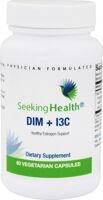
Product News
Seeking Health DIM & I3C was created.
Categories: DIM (Diindolylmethane), Female Sex Health, I3C, Women's Health -
Oct 02, 2025 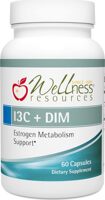
Product News
Wellness Resources I3C + DIM was created.
Categories: DIM (Diindolylmethane), Estrogen Blockers -
Aug 01, 2025 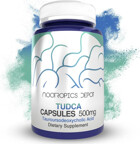
Product News
Nootropics Depot TUDCA was created.
Categories: Post Cycle Therapy, TUDCA -
May 28, 2025 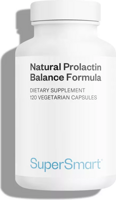
Product News
SuperSmart Natural Prolactin Balance Formula was created.
Category: Estrogen Blockers -
Apr 12, 2025 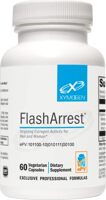
Product News
Xymogen FlashArrest was created.
Category: Estrogen Blockers -
Apr 11, 2025 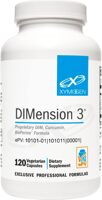
Product News
Xymogen DIMension 3 was created.
Categories: Curcumin with BioPerine, DIM (Diindolylmethane), Female Sex Health, Women's Health -
Apr 11, 2025 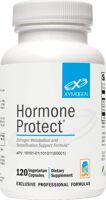
Product News
Xymogen Hormone Protect was created.
Category: Estrogen Blockers -
Mar 20, 2025 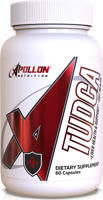
Product News
Apollon Nutrition TUDCA was created.
Categories: Post Cycle Therapy, TUDCA -
Mar 03, 2025 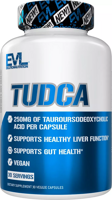
Product News
EVLution Nutrition TUDCA was created.
Categories: Post Cycle Therapy, TUDCA -
Feb 22, 2025 
Product News
Afterdark Estrozole Anti Estrogen was created.
Category: Estrogen Blockers -
Feb 22, 2025 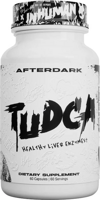
Product News
Afterdark Tudca was created.
Categories: Liver Cleanse, Post Cycle Therapy, TUDCA -
Feb 14, 2025 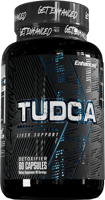
Product News
Enhanced Labs TUDCA was created.
Categories: Post Cycle Therapy, TUDCA -
Feb 09, 2025 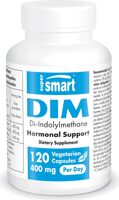
Product News
SuperSmart DIM was created.
Categories: DIM (Diindolylmethane), Female Sex Health, Women's Health -
Jan 26, 2025 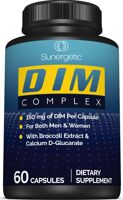
Product News
Sunergetic DIM Complex was created.
Categories: DIM (Diindolylmethane), Female Sex Health, Women's Health -
Dec 12, 2024 
Product News
Nugenix DIM was created.
Categories: DIM (Diindolylmethane), Female Sex Health, Women's Health -
Aug 17, 2024 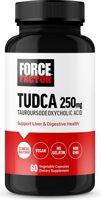
Product News
Force Factor TUDCA was created.
Categories: Post Cycle Therapy, TUDCA -
Jul 24, 2024 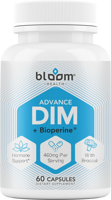
Product News
bloom Advance DIM + Bioperine was created.
Categories: Bioperine, DIM (Diindolylmethane), Female Sex Health, Women's Health -
Jul 10, 2024 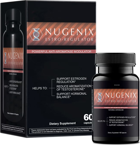
Product News
Nugenix Estro-Regulator was created.
Category: Estrogen Blockers -
Jul 06, 2024 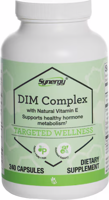
Product News
Vitacost Synergy - DIM Complex was created.
Categories: DIM (Diindolylmethane), Female Sex Health, Vitamin E, Women's Health -
May 08, 2024 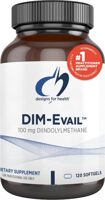
Product News
Designs For Health DIM-Evail was created.
Categories: DIM (Diindolylmethane), Female Sex Health, Women's Health -
May 06, 2024 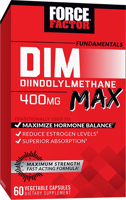
Product News
Force Factor DIM Max was created.
Categories: DIM (Diindolylmethane), Female Sex Health, Women's Health -
Apr 13, 2024 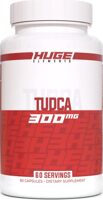
Product News
Huge Supplements TUDCA was created.
Categories: Post Cycle Therapy, TUDCA -
Mar 04, 2024 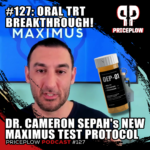
Blog Post
Oral TRT Breakthrough! Dr. Cam Sepah Boosts Maximus Testosterone Protocol | Episode #127
Oral TRT Breakthrough! Dr. Cameron Sepah returns to PricePlow with a groundbreaking Maximus Testosterone Protocol upgrade: oral TRT + enclomiphene -
Mar 04, 2024 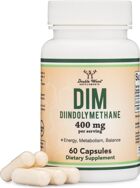
Product News
Double Wood Supplements DIM was created.
Categories: DIM (Diindolylmethane), Female Sex Health, Women's Health -
Mar 04, 2024 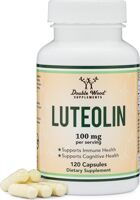
Product News
Double Wood Supplements Luteolin was created.
Category: Estrogen Blockers -
Feb 25, 2024 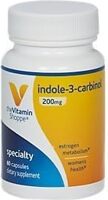
Product News
The Vitamin Shoppe Indole-3-Carbinol was created.
Categories: Female Sex Health, I3C, Women's Health -
Feb 25, 2024 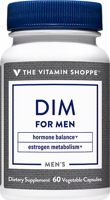
Product News
The Vitamin Shoppe DIM was created.
Categories: DIM (Diindolylmethane), Female Sex Health, Women's Health -
Feb 20, 2024 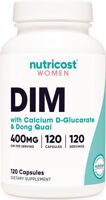
Product News
Nutricost DIM (for Women) was created.
Categories: DIM (Diindolylmethane), Female Sex Health, Women's Health -
Apr 27, 2023 
YouTube Video
AstroFlav Embrace: Premier Women's Hormonal Support -
Aug 05, 2022 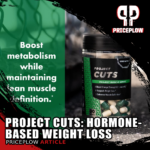
Blog Post
Anabolic Warfare Project Cuts: Weight Loss Through Hormone Balance
Anabolic Warfare Project Cuts helps accomplish weight loss through hormonal balance, not just stimulation! Boost metabolism while maintaining muscle. -
Jun 13, 2022 
YouTube Video
PROJECT MUSCLE INTRO | Anabolic Warfare muscle builder series -
Apr 26, 2022 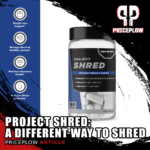
Blog Post
Anabolic Warfare Project Shred: A Different Way to Shred Down
Anabolic Warfare's Project Shred takes a unique, stackable approach to dieting: through estrogen and water control to eliminate puffiness! -
Feb 21, 2022 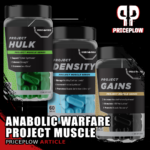
Blog Post
Anabolic Warfare Project Muscle Kicks Off with HULKing Success
Anabolic Warfare's PROJECT MUSCLE has arrived, bringing eleven very uniquely formulated supplements, three of them containing turkesterone! -
Feb 07, 2022 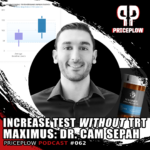
Blog Post
MAXIMUS: Testosterone Enhancement with Dr. Cameron Sepah | PPP #062
Dr. Cameron Sepah of Maximus joins to talk about boosting testosterone without TRT using his new telemedicine and coaching practice and ENCLOMIPHENE! -
Jan 06, 2022 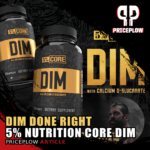
Blog Post
DIM Done Right: 5% Nutrition Core DIM (3,3′-Diindolylmethane)
DIM DONE RIGHT! See how 5% Nutrition formulated their "Core DIM", which has more than just 3,3′-Diindolylmethane inside! -
Nov 29, 2021 
YouTube Video
PROTECT YOUR LIVER! Core Lifeline series -
Oct 15, 2021 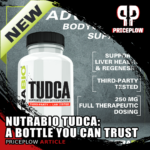
Blog Post
NutraBio TUDCA: A Liver Supplement You MUST Get Lab Tests On
NutraBio TUDCA brings Tauroursodeoxycholic acid in completely trusted and lab-tested form, which is exactly what you want when you need liver health! -
Sep 30, 2021 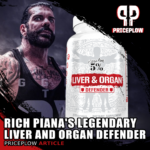
Blog Post
5% Nutrition's Liver & Organ Defender Brings ON Cycle Protection!
Rich Piana's Liver and Organ Defender from 5% Nutrition covers your body's needs with their that protects all your vital organs during "harsh" times -
Sep 23, 2021 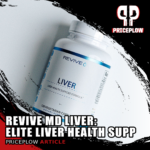
Blog Post
Revive MD LIVER: Elite Liver Health Supplement
Revive MD Liver brings an elite liver supplement with high doses of NAC, Milk Thistle, and TUDCA, all in a lab tested supplement with amplification! -
Jun 30, 2021 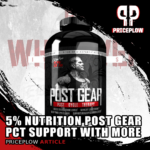
Blog Post
5% Nutrition Post Gear: Post Cycle Support with MORE
5% Nutrition's Post Gear is a post cycle therapy support supplement that helps with testosterone production, estrogen balance, strength, and more! -
Dec 29, 2020 
YouTube Video
I3C (Indole 3 Carbinole) vs DIM? PEScience TruI3C Discussion -
Jun 06, 2019 
YouTube Video
Testosterone & Performance Optimizer! Beast Super Test Max Review -
May 22, 2019 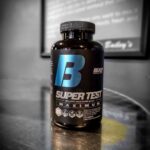
Blog Post
Beast Super Test MAX: A Guerrilla Chemist Take on Testosterone
Beast Super Test MAX is the mad strong natural testosterone booster formulated by The Guerrilla Chemist to add performance to the testosterone boost! -
May 11, 2019 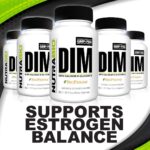
Blog Post
NutraBio DIM - An Athlete’s Hormone Optimizer
NutraBio DIM offers 100mg 3,3'-Diindolylmethane alongside 500mg calcium d-glucarate and 5mg BioPerine to help balance estrogen levels naturally! -
Mar 18, 2019 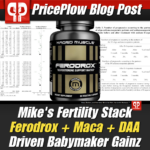
Blog Post
Men's Fertility Supplements: The Ferodrox-Driven Male Fertility Stack
With fertility supplements for men, there's one supplement with four of the six ingredients we like: Kaged Muscle Ferodrox! Then add Maca and DAA! -
Feb 17, 2019 
Blog Post
Muscle Building Supplements: The Next Generation (2019)
Muscle Building Supplements: The 2016 Guide. We all know about creatine, protein, and amino acids... but what are the NEXT generation muscle builders? -
Jul 26, 2017 
Blog Post
SNS Inhibit-E: Shut Estrogen Down Like a Boss
SNS Inhibit-E is an extremely potent all natural aromatase inhibitor that helps keep estrogen levels under wraps. -
Jun 27, 2017 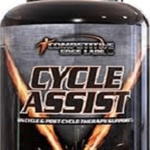
Blog Post
CEL Cycle Assist - On and Off Cycle Support
CEL Cycle Assist is the ultimate protection for your most vital organs whether you're on cycle or off cycle. -
May 09, 2017 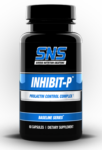
Blog Post
SNS Inhibit-P: Putting a Halt on Prolactin
Inhibit P by SNS is your ultimate protection from prolactin, which can lead to gyno and inhibit muscle building. Help stop man-boobs in their tracks! -
Apr 19, 2017 
Blog Post
CEL TUDCA - Supreme Liver Protector
CEL TUDCA is a perfect standalone ingredient for enhancing liver function and supporting it during the most aggressive supplement cycles. -
Nov 22, 2016 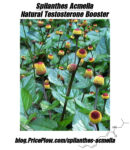
Blog Post
Spilanthes Acmella: Testosterone-Boosting Flower of Power
Spilanthes Acmella is an herb used in traditional medicine that is now being explored as a promising natural testosterone booster for athletes! -
Mar 07, 2016 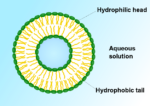
Blog Post
Cyclosome: New Age Liposome + Cyclodextrin Delivery System
Cyclosome is the next generation supplement delivery system by Hi-Tech Pharmaceuticals, which uses a combination of Liposome and Cyclodextrin! -
Dec 31, 2015 
Blog Post
Rich Piana Workout: 30lbs of Muscle in 3 Months Coming!
The Rich Piana Workout Plan: 30lbs of Muscle in 30 Days - Is coming! Are you non-natty and ready to do EVERYTHING Rich does in this workout and diet? -
Dec 01, 2015 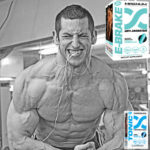
Blog Post
Jared's Magnum Tonic + E-Brake Log: Competitive Natural Bodybuilder
Jared is a natural bodybuilder who is running a supplement log on Magnum Nutraceuticals Tonic and E-Brake stack! Follow his progress on PricePlow! -
Sep 01, 2015 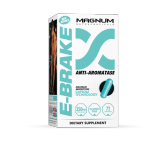
Blog Post
Magnum E-Brake: Putting the Brakes on Aromatase!
E-Brake is Magnum's aromatase inhibitor which puts the brakes on this dastardly enzyme robbing you of your much beloved testosterone.
Sign up for future Post Cycle Therapy news!
Click the button below to sign up for future Post Cycle Therapy news, deals, coupons, and reviews!
Post Cycle Therapy Reviews & Videos
-
Apr 27, 2023AstroFlav Embrace: Premier Women's Hormonal Support
-
Jun 13, 2022PROJECT MUSCLE INTRO | Anabolic Warfare muscle builder series
-
Nov 29, 2021PROTECT YOUR LIVER! Core Lifeline series
-
Dec 29, 2020I3C (Indole 3 Carbinole) vs DIM? PEScience TruI3C Discussion
-
Jun 06, 2019Testosterone & Performance Optimizer! Beast Super Test Max Review
Subscribe for more Post Cycle Therapy news and alerts!
Subscribe to PricePlow on YouTube, follow PricePlow on Instagram or click the button below to sign up for our latest Post Cycle Therapy news and reviews!






